Gamedec review
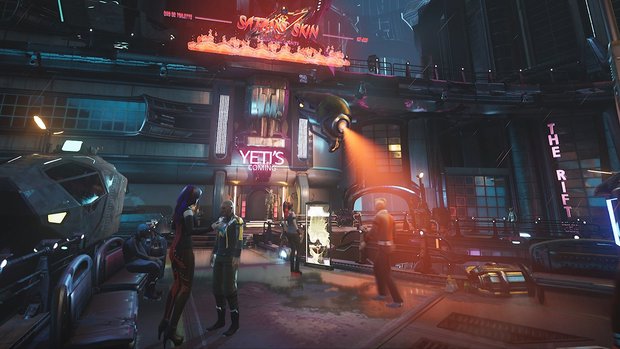
- 0 Comments
A virtual certainty that cyberpunk fans will enjoy this isometric narrative RPG
Where might today’s game industry take us if left unchecked to mutate into something more insidious? Gamedec’s cyberpunk premise is an entertaining, albeit literal, vision of just such a potential future. The technology running its fictitious free-to-play game worlds has established a nightmarish kind of techno-sweatshop where the virtual world can be just as dangerous as the real one. It ultimately reaches a predictable conclusion, but Gamedec is definitely more about the journey than the destination, filled with branching pathways and well-written dialogue. The end result is a superbly crafted narrative RPG lifted more by the merits of its storytelling system than the story itself.
The game takes place in Warsaw City, 2199, a megacity made up of numerous sprawling towers that house tens of thousands of people. Society is ravenously capitalist, as displayed by robots with hologram advertisements hovering right outside of your window. The ‘real world’ is referred to as Realium, in which you own a sizable one-bedroom apartment with a nice view of the city below (if you choose to start in the mid-city, that is) and ample sunshine. From here you run your own business as a Gamedec, a private detective who operates in the digital worlds of Virtualium, where people retreat to for escapist comfort.
Some of the popular Virtualiums include Harvest Time, a Western-themed farming simulator riffing on the likes of FarmVille; Knight’s Code, a feudal-themed, clan-based MMO where role-playing is taken very seriously; and Twisted & Perverted, a grimy urban-based arena resembling an open-world crime game where violent and sexual activities are the main draw. People log into these games via couches one lies on in order to be put into a trance state and become fully immersed in the virtual world. Playing a Virtualium is indistinguishable from reality, at least insofar as sensory input is concerned, potentially making them quite addictive.
Gamedecs are sometimes called into these scenarios to investigate anomalies. Or, they may just be looking for information, and since tracking someone down in Realium can prove difficult, meeting someone’s online persona at their favorite (virtual) drinking hole may be more practical. How you approach these cases is largely up to your character build and the alliances/enemies you make along the way. Though your missions appear to be unconnected gigs at first, an overarching narrative soon takes hold that ties them all together.
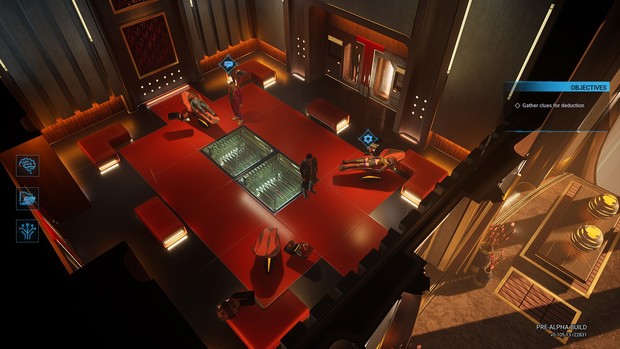
As with many RPGs, Gamedec begins with players choosing or building an avatar. A number of preset characters are available, as are several customizable characters. You can pick an apartment location, select your pronoun, and change your name. You also decide your (or are assigned, if using a prebuilt character) “Values,” which connote your starting points for building your character’s “Professions,” a range of statistics scattered across four parameters to define their area(s) of expertise. You get a backstory unique to each character, allowing you to role-play and respond to situations in tandem with your chosen Professions, comprising the street tough Sleeves; mechanical and technically inclined Glaziers; medically trained Scalpels; and persuasive influencers called Infotainers. I chose the preset character Izmael Krostov, who starts with double the Sleeves and Infortainer points than Glazier and Scalpel.
How big your muscles are in Realium may help you strong-arm people for answers in the real world, but in a Virtualium they have little effect. Though there are sections of the game that test players’ reflexes via time limits, Gamedec is not an action game, and even characters with combat prowess only get to manifest their proficiencies in dialogue and choice trees. Thus, the skills you bring into a Virtualium, like hacking to exploit a game’s architecture, for example, are what count.
Your first Gamedec case has you travelling to level 255 of your own megatower to meet Geoffrey Haggis, who has called you to his office in order to save his son, who appears to be unable to log himself out of a game. I attempted to build Izmael into a medical specialist, and thus was able to survey the physical scene in unique ways, including diagnosing the young man’s condition by checking his breathing and pulse, theorizing what kind of trouble he may be experiencing in-game. Of course, this only unlocked part of the picture. After interviewing others in the office in order to get a clearer history, I entered the game world to look for him and was able to start working the case proper. A bit later I visited Twisted & Perverted and opted to help out a man looking for his wife. When I found her, he returned the favor by offering his services as a data broker, allowing me to “call a friend” at a later point to have him feed me helpful information.
At roughly the midpoint of the game, I was presented with a choice to investigate a club in Realium or return home to my apartment. I went to the club, and had to navigate between two rival gangs hanging out there, using a mix of my skill sets (including showing off my dance moves) to make alliances with one over the other, and utilizing the information they subsequently gave me to further my investigation. The way I’d built my character severely funneled the types of choices I could make in terms of performing acts to earn different people’s trust, but I was nevertheless able to eventually find the clues I needed to progress the story. This goes for every scenario in the game, though at the specific parts with overt branching scenarios like this one, the strengths (and weaknesses) of your Professions are all the more evident as you are forced to think your way through roadblocks as opposed to simply choosing an option from a dialogue tree.
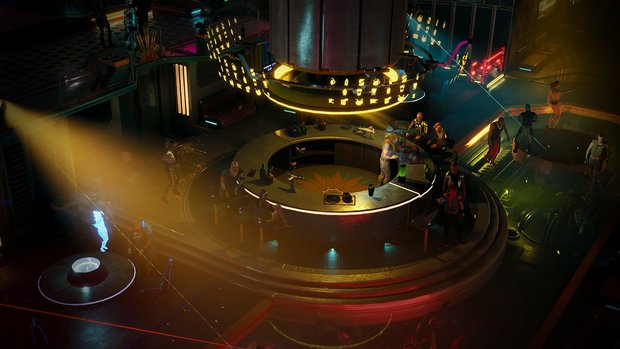
You’ll receive additional allocation points for your Profession skill tree depending on how you handle situations. If you want to play aggressively, for example, you’ll try to get red (flame) points (associated with the Sleeve profession), which can be spent on opening up new skills, which in turn unlock new options in dialogue and choice trees. New skills on the Profession tree require multiple points, meaning you may need one or two from a different Profession in order to access the next path of upgrades, forcing you to make choices you wouldn’t normally in order to get that credit. The game explains this interaction system of colours in depth, though I had a hard time getting the hang of it at first. As a result, I ended up with a ton of blue puzzle (Infotainer) points when in fact I was trying to get green heart (Scalpel) points to upgrade my character, ultimately resulting in my not having a fully upgraded Izmael and a bunch of unspent points by the end.
After a short cinematic, most of Gamedec is played from an isometric perspective. You can use the WASD keys or the mouse to move about, clicking to interact with NPCs or points of interest (marked by diamond markers connoting the action you can perform, like talking or touching). Controllers are also fully supported. The mouse works fine, though it makes circumventing long distances more tedious than using the keyboard. The latter has its own problems, however, as I found the first press of an input key often failed to register, meaning I would have to press a directional button, release it, then press it again (or click the mouse) in order to get my character moving. This carried over to the menu as well, where selecting or clicking on an icon required multiple presses. I got used to it after an hour or so, but it was still a cumbersome quirk.
Gamedec offers an optional in-game tutorial, and I would have been absolutely lost without it. Whenever you interact with another person or object and receive information, that data is filtered into one of three places in your logbook: Professions, Codex, or Deduction. Information in the Codex is composed of notes about people and the game world for reference. Info critical to the case is logged under the Deduction tab, where your collected clues are compiled in relation to your current objective. Once you have enough details, you begin unlocking theories, which in turn move the plot along after you settle on one.
There are usually between two to four possible theories you can form for each Deduction, the first of which generally becomes available after obtaining one or two clues. Though you can jump at this one to speed things along, further investigation will likely unlock further alternatives. I say “likely” because the dialogue tree system sometimes locks off certain routes after choices, meaning one wrong word or action may turn a character against you, closing an avenue for discovering another clue. Some dialogues even have a trust metre, a mini-game where you must answer a series of questions in succession, which will move a trust bar left or right (or not at all), hopefully hitting padlock markers connoting the character’s willingness to reveal information.
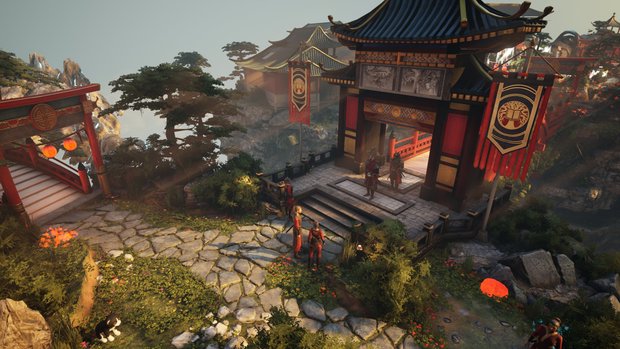
Once you commit to a theory, there is no going back (unless you reload a save, of course), meaning you should be sure of your answer before moving on. And yet no matter how confident you are, it isn’t necessarily the correct one. In fact, you may simply be building off a series of false assumptions, and the game always moves forward anyway. In this sense Gamedec is very forgiving, as it lets you get by with minimal investigative effort or sound reasoning. However, there were times when I knew the deductions available to me were likely not the right ones, but due to my character build and past choices (which the game records and highlights in dialogue), I was unable to uncover alternatives.
You can save as often as you like on the Normal difficulty setting, though on the harder True Detective setting the game limits you to autosaves at predetermined points, spaced quite a ways apart. Though save scumming is a legitimate way to trial-and-error your way to a desired conclusion, I played the game (mostly) straight, sticking with my choices even if I felt I had made a mistake in hindsight.
A quest log on the right side of the screen can be easily opened, providing more details as to your current objectives. Some of these goals close off after a certain amount of time if not completed, or if conflicting objectives are met instead. A rather complex section in one of the Virtualiums called Knight’s Code, for example, had me trying to infiltrate a cult of dedicated role-playing characters in the MMO by completing tasks in rigidly timed segments while also trying to conduct my own investigation. I was quickly overwhelmed by the number of tasks presented, and after failing to produce the results the clan desired, I was banished to a prison room for several in-game “turns” before the story simply moved on, ending the option for me to pursue other leads.
Reflecting on the broader narrative after completing the game, I feel better equipped to tackle such scenarios in a second playthrough, though the weight of working with so many different factions and characters, within the confines of your character build and choices, makes the number of ways to navigate your way through Gamedec a daunting but nonetheless exciting exercise. There were times when I was slightly lost at what to do, though thanks to the areas all being relatively small, and the quest guide being fairly clear as to what needed to be done, I usually found my way after a few minutes, shuffling back between characters and points of interaction to see if anything had changed.
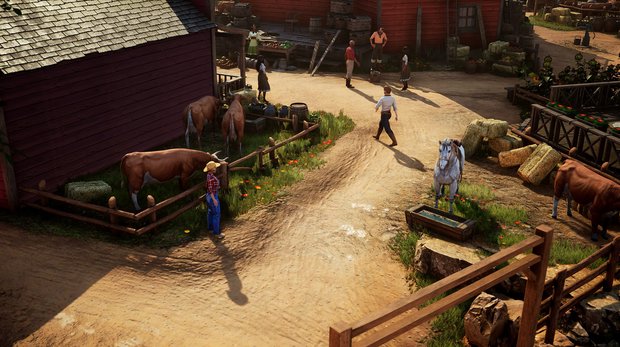
The game branches at several junctions, allowing you to explore different leads entirely. Though the narrative is more or less linear, always pushing you in one direction, there are a multitude of routes to get there, both in choosing where to physically travel with your character at certain points, as well as through your avatar build and choices. At the end I was presented with six possible options, though after the game reviewed my actions (including criteria like who I had killed, helped, or taken favors from), I was only able to select two of the six.
Where Gamedec more clearly distinguishes Virtualium from Realium is in some of the game-within-a-game activities. While these can’t quite be defined as mini-games, I spent a bit of extra time farming in Harvest Time, for example, and earned my farm some vanity items. These had no use whatsoever, but the fact that I could choose to partake in the drudgery of a skill-less, grind-focused MMO was an enjoyable bit of satirical freedom, allowing me to “play” the game as if I were building towards something when in fact it was a time-filling diversion.
The Definitive Edition of Gamedec, which is now the default version for purchase, features the harder difficulty mode, new cutscenes, new characters/avatars, and bonus scenarios. One such scenario is a prequel story with Ken Zhou (who plays a large role in the main campaign), a sort of esport personality. In this scenario, Ken is called to investigate the private Virtualium of a major business. I played the game a bit bolder and more aggressive here than I did the main campaign, building Ken into a very different character than I had with Izmael. It’s a shorter mission, and the skill tree is significantly simpler, only requiring one type of Profession token to unlock new skills instead of multiple types. But seeing as it’s only around two hours long, and I still hadn’t fully upgraded Ken by the end, there is a good amount of replayability in this scenario too. Although I’m not sure I’ll ever go back, as some of the puzzles I found quite tedious, like assembling a crime scene, and it didn’t differ that much from the main campaign’s gameplay rhythm, instead mostly offering a new environment to explore.
The world’s (physically) layered society is evident throughout the game, though never as deeply (excuse the pun) as it feels it should be. Because all of the locations are so small, and you rarely have free rein to move between them, the game ends up feeling quite confined. The smaller areas are more accessible from a gameplay standpoint, as they prevent you from getting lost. However, from a worldbuilding standpoint, it never feels like you’re a real private detective calling your own shots in an awe-inspiring cyberpunk metropolis because you’re continually funneled through predetermined routes in confined areas.
There are a few Tron-style variations in non-gaming virtual areas that look quite cool, like a fractal aesthetic akin to the inside of a crystal near the beginning of the game. Virtualiums, however, remain graphically unchanged from Realium, aside from a banner at the top of the screen depending on the game world you’re in. Harvest Time has a bar that keeps track of your gold and loot crates, for example, whereas Twisted & Perverted has a kill count and weapon slot. On one hand this makes sense, as Virtualium is meant to be indistinguishable from reality when logged in. However, from a gameplay perspective, it makes all of the worlds feel kind of same-y, even with the different settings. Harvest Time’s Wild West looks like a prairie landscape, for example, and Knight’s Code looks like a feudal castle.
There is a good amount of detail and animation in the environments, making them feel like places populated by other players and not just a set of static NPCs waiting to be interacted with. Character movement is fluid and smooth. Portraits during dialogue and in your notes are hand drawn, while the in-game models are fully 3D. The game isn’t completely voiced, but many characters are, which is nice because Gamedec is so dialogue heavy, requiring you to read many thousands of words. Fortunately it's all well-written, which makes it easy to get invested in role-playing your character.
The soundtrack and environmental audio change appropriately to the world you are currently in. A club in Realium I went to had techno blaring in the background, though much of the game is devoid of music. The score, when it does play, mirrors Don Davis’s work on The Matrix, with orchestral pieces lending an epic and suspenseful aura that suits the cyber sleuthing action quite nicely whenever it appears.
Where the game falls a bit flat is in its setting, mimicking sci-fi cliché more than carving out its own niche. Gamedec presents a recognizable cyberpunk vision that critiques the gaming culture as it exists today were it to spin out of control. Virtualium players banding together to form guilds and harvest in-game currency to buy vanity items in game, escaping the drudgery of their lives in Realium, is a look at how an industry run rampant by greed might devolve into a series of free-to-play sex and farming games. While certainly a topical observation, it ends up making the game feel more contemporary than futuristic. I wish we had gotten to see behind the curtain a bit more, as the setting and story are too mundane to elicit much surprise. It’s certainly not bad science fiction, just a bit too familiar.
Final Verdict
Although not as deep as I’d have liked, Gamedec is an enjoyable narrative RPG with thoughtful gameplay pacing and direction. A first playthrough will take around eight hours, and subsequent return trips will likely be just as long, given the multitude of routes to explore. It’s highly replayable, and character progression manages to be involved without becoming too complex. The cyberpunk setting isn’t anything we haven’t seen before, but the investigative mechanics nevertheless pulled me into the world and kept me feeling invested in it. Character building is smartly woven into the narrative structure, and how the game opens and closes routes according to your choices is fantastic. You don’t always have a lot of control over where to go and when, but you’re still tasked with putting clues together in order to build your cases, so it never feels like you’re simply on autopilot with any given route you take. Ultimately, adventure and role-playing fans alike will undoubtedly be impressed with the genre-bending experience, making it an easy recommendation.
Hot take
It’s a shame there isn’t more opportunity to explore the world at large, but Gamedec is a rewarding and immersive role-playing adventure that offers a satisfying amount of player agency in the direction of this cyberpunk detective mystery.
Pros
- Highly replayable narrative-focused role-playing allows for a multitude of approaches
- Deduction system requires carefully reviewing clues before committing
- Welcome use of intermittent voice acting in a largely text-based experience
- Well-paced gameplay presents a broad array of situations to circumvent
- Opportunities to involve yourself in Virtualium-specific gameplay are humorous and welcome additions
Cons
- Setting feels underdeveloped, both in terms of narrative ambition and physical scale
- Predictable ending
Drew played Gamedec using a review code provided by the game's publisher.


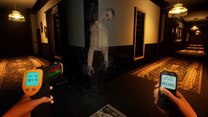







0 Comments
Want to join the discussion? Leave a comment as guest, sign in or register in our forums.
Leave a comment